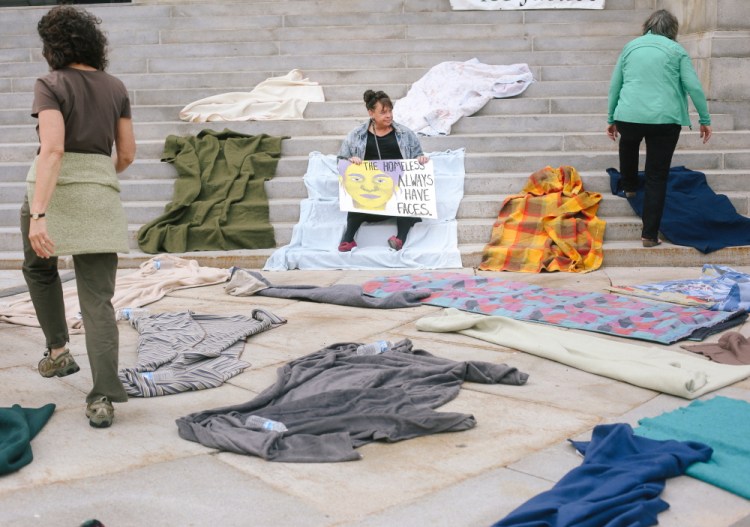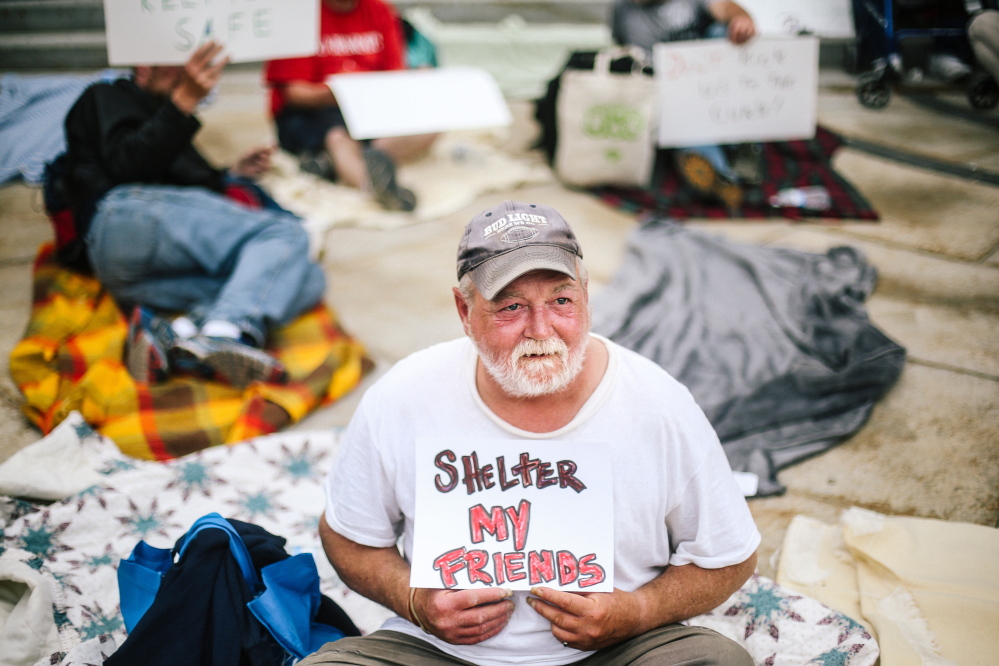A City Council committee considering the future of an emergency shelter scheduled to close June 30 decided to let the full council decide its fate after homeless advocates staged a large protest on the steps of City Hall and then gave impassioned testimony against its closure.
The protesters jammed a Public Safety and Health and Human Services Committee hearing that lasted just over two hours, and all of the roughly 45 people who spoke opposed closing the so-called overflow shelter for homeless men at the Preble Street social services center. They also opposed discontinuing the city practice of paying for hotel rooms to house homeless families, including children.
“We know that you are not the bad guys here,” Mark Swann, the executive director of Preble Street, told the councilors. “But this plan to close the overflow shelter is a really bad idea. As it stands now, as of July 1, there will be no safe place for 100 people, including children, to go.”
The changes could potentially affect 75 men, who sleep on mats in the overflow shelter, and roughly 30 parents and children, who are unable to stay at the city-operated family shelter on Chestnut Street once it has reached capacity.
City officials say their actions are being driven by a drastic reduction in state aid for General Assistance and for operation of Portland’s homeless shelters. The city has argued that the state has historically paid for the operating costs of Portland’s shelters.
According to the city, the state will reduce its General Assistance and shelter aid to Portland – effective July 1 – from $8.6 million to $3 million. That reduction will force the city to pay $1 million more next fiscal year than it did this fiscal year to operate emergency shelters.
“We are on an unsustainable path,” said Councilor Edward J. Suslovic, who chairs the public safety committee. “I don’t see how the taxpayers of Portland can make up for this significant loss in state funds.”
Next year’s city budget would cut $128,000 in funding for the overflow shelter, but some councilors expressed an interest in tapping into a $350,000 transition fund that the city plans to use to cover shortfalls in next year’s General Assistance and shelter operating budgets.
“What I’m hearing tonight is there is strong interest in using those transition funds to maintain the overflow shelter. It could be for a month or as long as a year,” Suslovic said.
Norman Mayes, the housing director for Shalom House, which provides affordable housing for people with serious mental illness, including the homeless, believes the city has to stay true to its identity.
“Portland has always been a welcoming community that has embraced everyone,” he said. “Portland is in danger of losing its identity.”
The state also is seeking to prohibit certain types of immigrants from receiving General Assistance – a proposal that could affect 900 people in Portland. The city is contesting that policy change in court. The case is pending.
Suslovic and other members of the committee said the issue of whether to fund the city shelter should be left up to the full City Council, which is scheduled to meet Monday night. Passage of the municipal budget is expected to take place at that meeting.
Only four city councilors, including Suslovic, sit on the Public Safety and Health and Human Services Committee, but Mayor Michael Brennan and Councilor Jon Hinck also were in attendance as non-voting members. The council consists of nine members.
“I don’t think there is going to be a budget passed by this council that does not include funding for an overflow shelter,” Brennan predicted.
A crowd of more than 200 people gathered at City Hall Plaza on Tuesday afternoon to protest the plan to close the overflow shelter and stop sending homeless families to motels. The demonstration was organized by Preble Street Homeless Voices for Justice. They carried signs that said, “Don’t let LePage win,” Don’t leave us out in the cold,” and “Life on the street is deadly.”
“We don’t view the city as the bad guys here,” said Thomas Ptacek, a Gulf War veteran who has been homeless but works for the Preble Street Resource Center. “Their hand is being forced by Augusta. But when you have an overflow shelter with 75 people, you just can’t close it without a plan.”
Members of the council committee were presented with a handout that had been developed by city staff. The city determined that in 2014, 677 people or about 20 percent of those receiving General Assistance and using city shelters were from Portland. However, the majority of users, 1,060 people or 32 percent of the population, were from other parts of the state of Maine.
“My name is Bob Bergeron and I live in Deering Oaks parks,” Bergeron told councilors. Bergeron, who is homeless, said people without a shelter will take to the streets and there will be an increase in crime. “What are the body bags going to cost? People are going to be dying in the streets.”
Send questions/comments to the editors.





Success. Please wait for the page to reload. If the page does not reload within 5 seconds, please refresh the page.
Enter your email and password to access comments.
Hi, to comment on stories you must . This profile is in addition to your subscription and website login.
Already have a commenting profile? .
Invalid username/password.
Please check your email to confirm and complete your registration.
Only subscribers are eligible to post comments. Please subscribe or login first for digital access. Here’s why.
Use the form below to reset your password. When you've submitted your account email, we will send an email with a reset code.